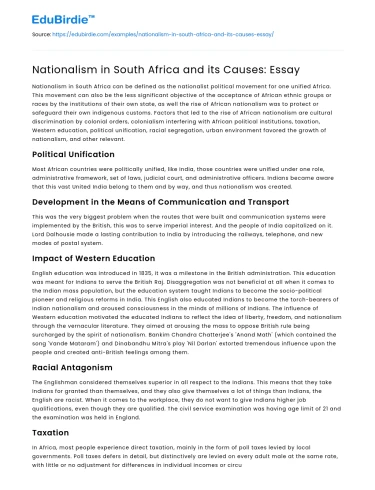Nationalism in South Africa can be defined as the nationalist political movement for one unified Africa. This movement can also be the less significant objective of the acceptance of African ethnic groups or races by the institutions of their own state, as well the rise of African nationalism was to protect or safeguard their own indigenous customs. Factors that led to the rise of African nationalism are cultural discrimination by colonial orders, colonialism interfering with African political institutions, taxation, Western education, political unification, racial segregation, urban environment favored the growth of nationalism, and other relevant.
Political Unification
Most African countries were politically unified, like India, those countries were unified under one role, administrative framework, set of laws, judicial court, and administrative officers. Indians became aware that this vast United India belong to them and by way, and thus nationalism was created.
Save your time!
We can take care of your essay
- Proper editing and formatting
- Free revision, title page, and bibliography
- Flexible prices and money-back guarantee
Development in the Means of Communication and Transport
This was the very biggest problem when the routes that were built and communication systems were implemented by the British, this was to serve imperial interest. And the people of India capitalized on it. Lord Dalhousie made a lasting contribution to India by introducing the railways, telephone, and new modes of postal system.
Impact of Western Education
English education was introduced in 1835, it was a milestone in the British administration. This education was meant for Indians to serve the British Raj. Disaggregation was not beneficial at all when it comes to the Indian mass population, but the education system taught Indians to become the socio-political pioneer and religious reforms in India. This English also educated Indians to become the torch-bearers of Indian nationalism and aroused consciousness in the minds of millions of Indians. The influence of Western education motivated the educated Indians to reflect the idea of liberty, freedom, and nationalism through the vernacular literature. They aimed at arousing the mass to oppose British rule being surcharged by the spirit of nationalism. Bankim Chandra Chatterjee's 'Anand Math' (which contained the song 'Vande Mataram') and Dinabandhu Mitra's play 'Nil Darlan' extorted tremendous influence upon the people and created anti-British feelings among them.
Racial Antagonism
The Englishman considered themselves superior in all respect to the Indians. This means that they take Indians for granted than themselves, and they also give themselves a lot of things than Indians, the English are racist. When it comes to the workplace, they do not want to give Indians higher job qualifications, even though they are qualified. The civil service examination was having age limit of 21 and the examination was held in England.
Taxation
In Africa, most people experience direct taxation, mainly in the form of poll taxes levied by local governments. Poll taxes defers in detail, but distinctively are levied on every adult male at the same rate, with little or no adjustment for differences in individual incomes or circumstances. In East Africa and elsewhere in sub-Saharan Africa, poll taxes have been the dominant source of revenue for local governments, although their financial importance has tended to diminish over time. They have their origins in the colonial era, where at first they were effectively an alternative to forced labor. Poll taxes have been a source of tension and conflict between state authorities and rural people from the colonial period until today, as well as the catalyst for many rural rebellions.
Cultural Discrimination
During that time of colonization, when Europeans were taking control of everything in African society, they ended up engaging in cultural discrimination. Most people in different African cultures were discriminated against, in the workplace, they were not allowed to work in there. According to South African history, in the first two decades of the Union (1910-1930), the governments of Louis Botha, Jan Smuts, and J. B. Hertzog promulgated a barrage of discriminatory laws and regulations that tightened state control over black people. The most important law passed was the Natives Land Act of 1913. This law reserved 93% (revised to 87% in 1936) of the land in South Africa for whites; it prevented two-thirds of Africa's population at the time from freely buying land. The small African 'reserves' created by the Land Act were a forerunner of the apartheid-era 'Bantustans' or 'homelands'. Denying the majority of South Africa's inhabitants, the right to own land had major socio-economic and political repercussions.
Colonial Administrations
Since 1652, successive colonial administrations had systematically deprived black communities of their land. The loss of this crucial resource was arguably the most important factor leading to the impoverishment and marginalization of African communities. It was also arguably the most important factor spurring formative organized resistance. Preliminary drafts of the Natives Land Act were debated in 1911 and the Mines and Works Act was passed in 1911. These laws and the formation of the Union were important factors leading to the formation of the South African Native National Congress on 8 January 1912 in Bloemfontein, renamed the African National Congress in 1923. Land dispossession lies at the heart of South Africa's history and heritage of inequity. The new ANC was created against the backdrop of the massive deprivation of Africans' right to own land.
Conclusion
It can be concluded that the rise of African nationalism before and after 1945 was caused by many factors that were bad for African citizens, they had to fight for their own independence and their own land.






 Stuck on your essay?
Stuck on your essay?

